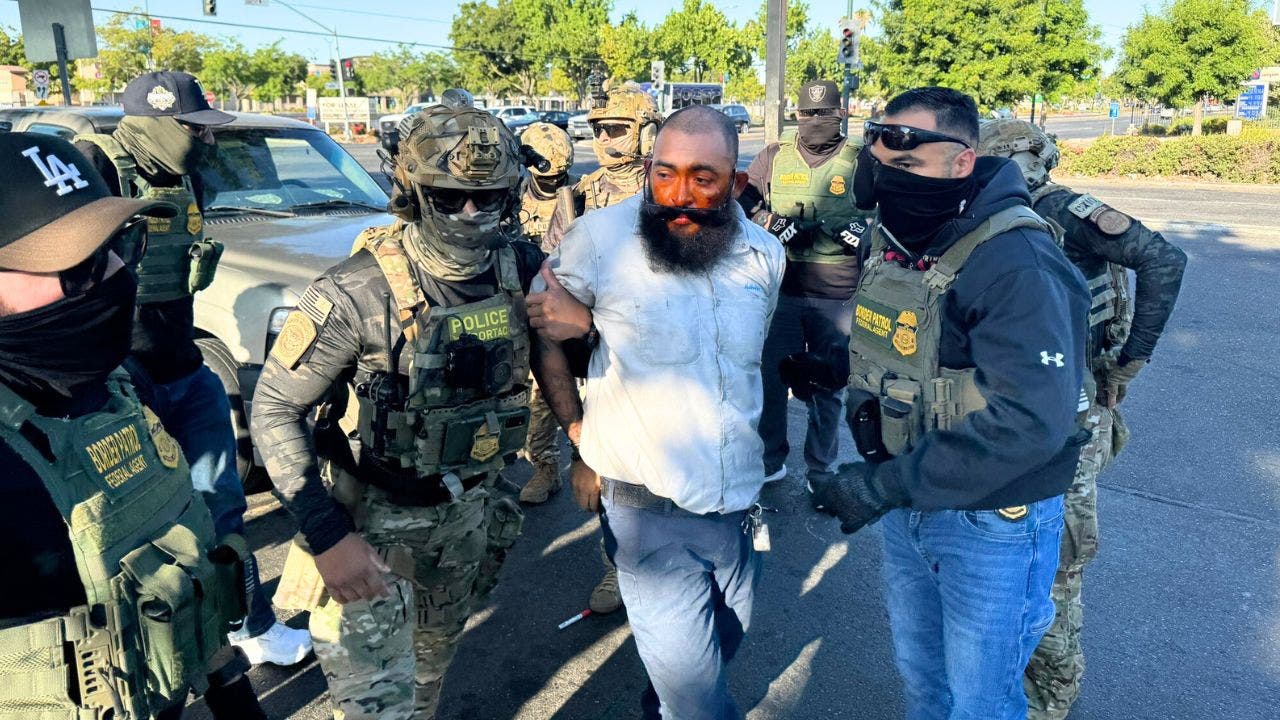Regional powers clash after Israel targets Syrian territory in defense of vulnerable Druze civilians
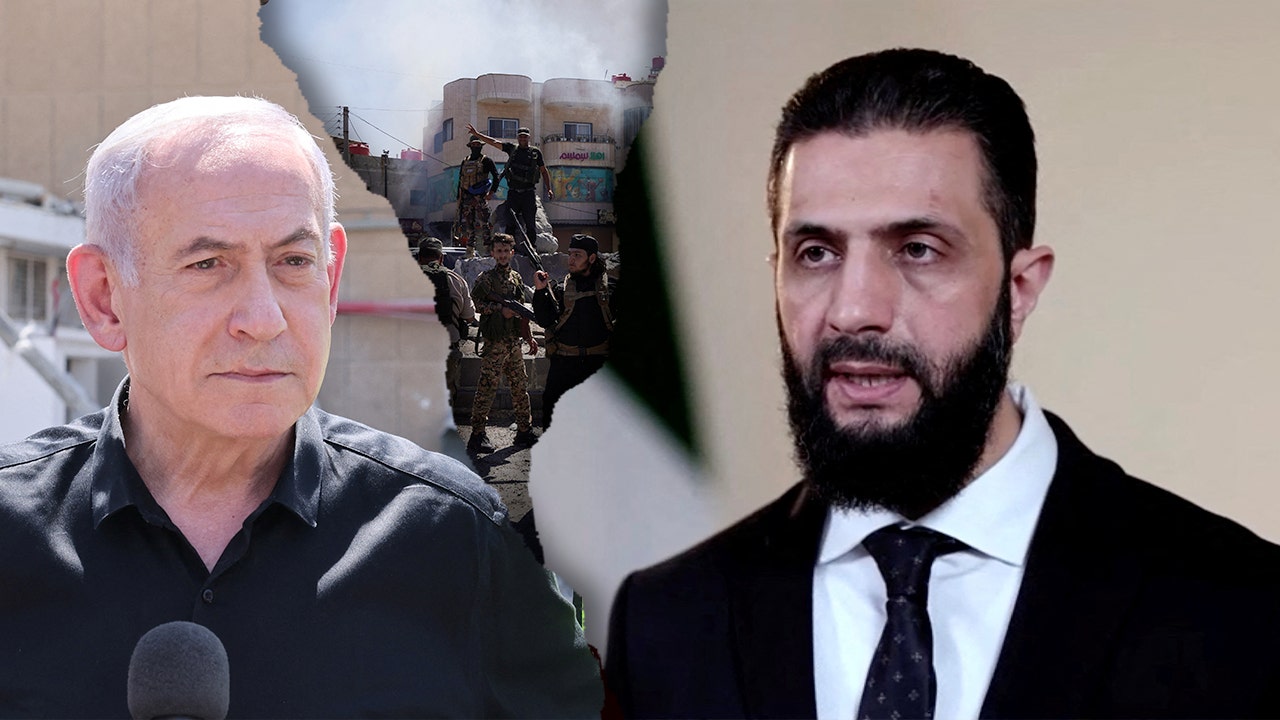
‘If someone tries to hurt us they will answer’
Fox News chief foreign correspondent Trey Yingst reports from the Israel–Syria border, where hundreds of Israeli Druze crossed into Syria on Wednesday to protect their Syrian kin from militant attackers.
NEWYou can now listen to Fox News articles!
Israel’s military strikes in Syria this week — launched in response to atrocities against the Druze minority — represent a strategic turning point in a deeper power struggle that now entangles Iran, Turkey, Israel, Saudi Arabia and the U.S., according to regional analysts.
Just days ago, speculation swirled about a potential normalization agreement between Israel and Syria — a breakthrough quietly brokered by U.S. officials, but that fragile prospect has been swiftly overtaken by violence, as Israeli airstrikes this week struck near Damascus.
A ceasefire agreement between Druze factions and the Syrian government, announced July 16, was meant to calm days of deadly clashes, but it remains tenuous and largely unenforced, with sporadic fighting continuing and tensions running high.
WHY SYRIA PLAYS A KEY ROLE IN TRUMP’S PLANS FOR MIDDLE EAST PEACE
Members of the media photograph the aftermath of an Israeli airstrike on Syria’s defense ministry headquarters on July 16, 2025 in Damascus, Syria. (Ali Haj Suleiman/Getty Images)
“For the Druze in Israel, what’s happening in southern Syria feels like October 7 all over again,” said Avner Golov, vice president of the Israeli think tank Mind Israel. “Israel can no longer treat Syria as just a neighboring crisis. It’s now a domestic one.”
In a rare scene, Israeli Druze citizens crossed the border into Syria to support their embattled relatives — prompting a stern warning from Prime Minister Benjamin Netanyahu.
“My Druze brothers, citizens of Israel… Do not cross the border,” Netanyahu said. “You are putting your lives at risk — you could be killed, you could be kidnapped — and you are harming the IDF’s efforts. Let the IDF do its job.”
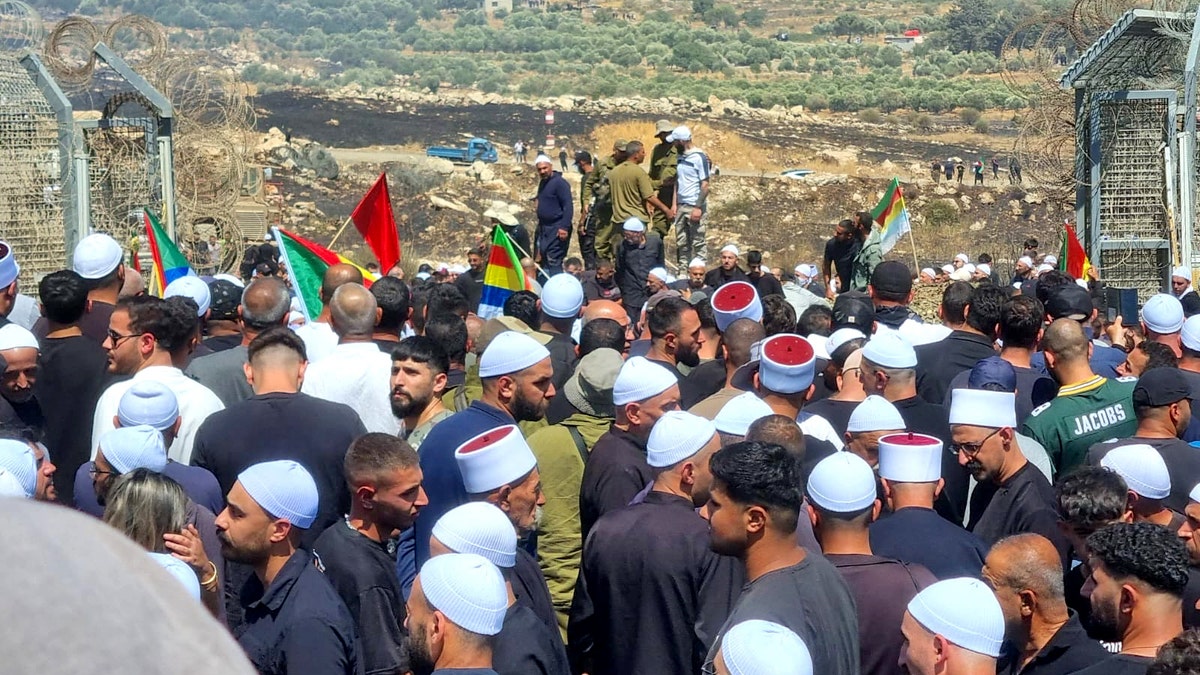
Israeli Druze in the Golan Heights mass along the Syrian border on July 16, 2025. Many breached the border in a bid to help their Syrian brethren, who have been locked in days of ethnic violence against Bedouins and the Syrian army. (Eitan Elhadez-Barak/TPS-IL)
In his first televised address since the Israeli strikes, Syrian transitional President Ahmed al-Sharaa framed the Israeli intervention as a destabilizing act.
“Government forces deployed to Suweida succeeded in restoring stability and expelling outlawed factions despite the Israeli interventions,” he said, warning that the strikes led to “a significant complication of the situation” and “a large-scale escalation.” He insisted that protecting the country’s Druze minority was a top priority and declared that Syrians “are not afraid of war.”
Within Israel, the collapse of order in Syria has triggered sharp debate. Some policymakers argue for supporting Sharaa as an anti-Iranian strongman, while others advocate broader military action to create a buffer zone in southern Syria. Golov supports a middle course: conditional strikes paired with demands for Druze autonomy and accountability for war crimes.
“If Sharaa shows he’s willing to punish those responsible for the massacre and agree to Druze autonomy, then Israel can gradually work with him,” Golov told Fox News Digital.
TRUMP’S PUSH FOR ISRAEL-SYRIA PEACE GETS MAJOR BACKING AS ACTIVIST BRINGS MESSAGE TO JERUSALEM
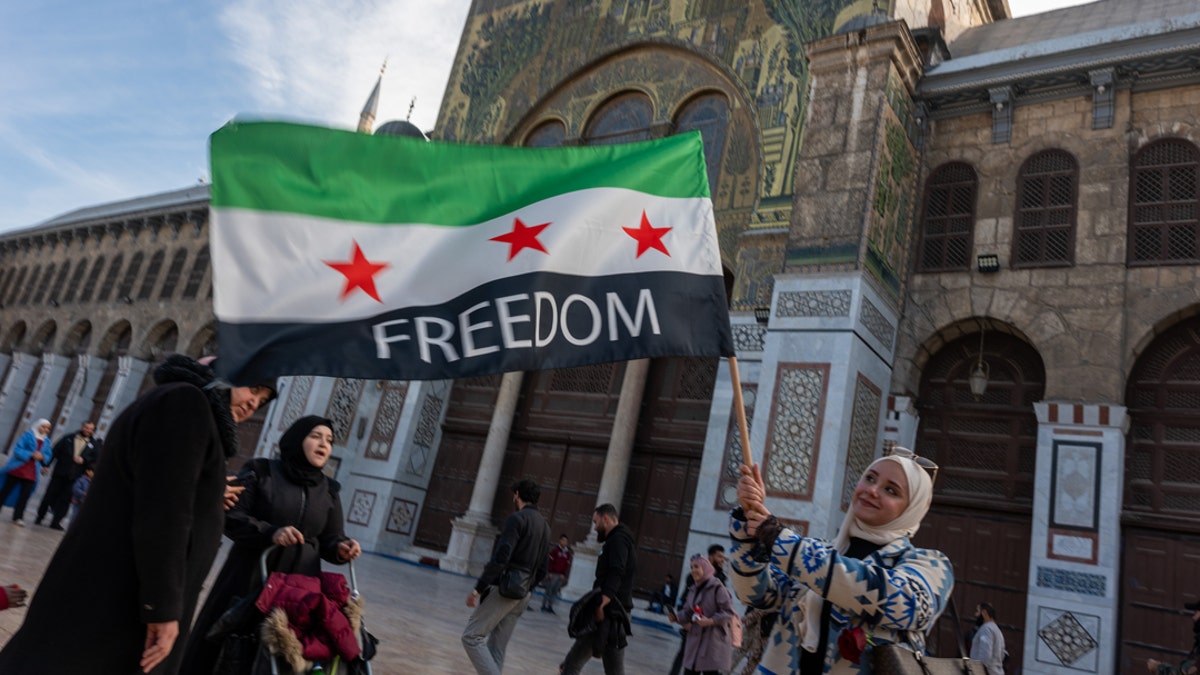
A woman waves a Syrian flag as people walk through the courtyard of the Umayyad mosque in the Old City in central Damascus on Jan. 16, 2025 in Damascus, Syria. (Photo by Spencer Platt/Getty Images)
He also called for a regional diplomatic effort to stabilize Syria. “We need a regional summit — the U.S., Saudi Arabia, even Turkey, and Israel” he said. “Bring positive forces into Syria and use Israeli military power not just tactically, but to gain diplomatic leverage.”
“There’s a temptation to miss the victory lap,” said Behnam Taleblu, senior director of the Iran Program at the Foundation for Defense of Democracies (FDD). “Rather than see Syria through the prism of competition with Turkey, Israel should first see it through the prism of diminished competition with Iran. That in itself is a huge achievement.”
Turkey: Alarmed, but invested
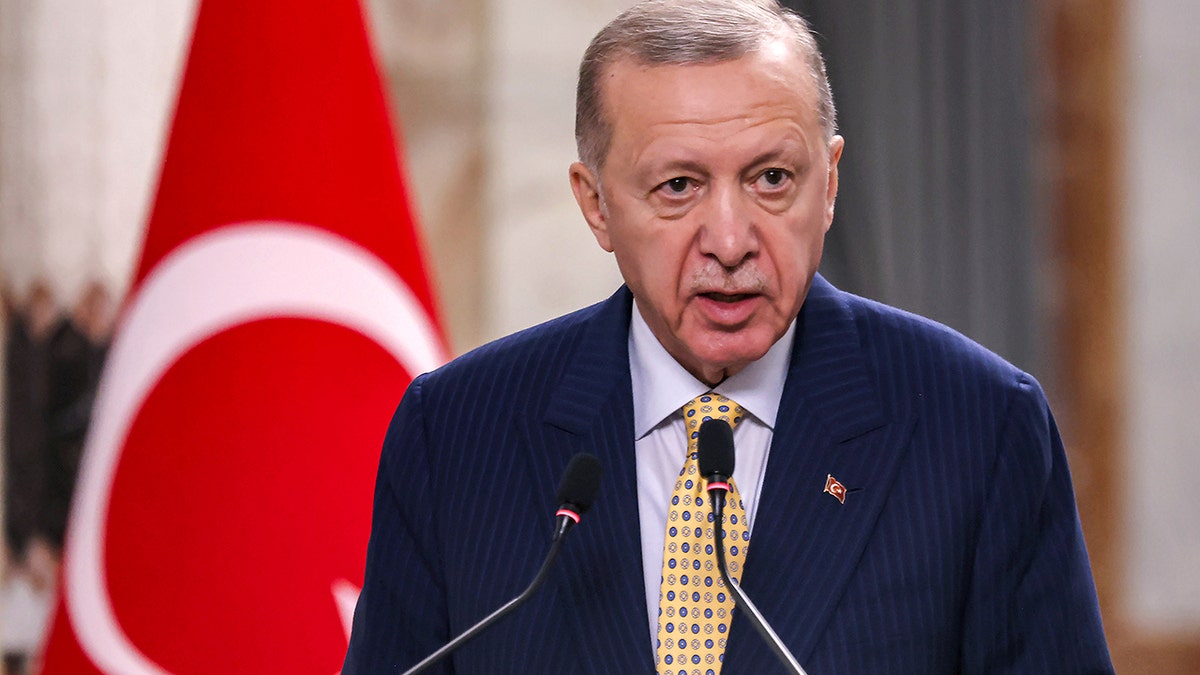
Turkish President Recep Tayyip Erdogan speaks during a joint statement to the media in Baghdad on Monday, April 22, 2024. (Ahmad Al-Rubaye /Pool Photo via AP)
While Iran’s position has weakened, Turkey has quietly expanded its footprint in Syria by backing the al-Sharaa government.
Turkey’s strategic interest in Syria, Sinan Ciddi, a senior fellow at FDD and director of the Turkey program, explained, is to fill the vacuum left by Iran with its own political and economic influence — using al-Sharaa regime as a conduit. “Turkey has a lot riding on al-Sharaa success,” he said. “They’d like to see increased trade, the reconstruction of Syria through al-Sharaa. They want to use him as a means to influence the region politically.”
However, Israel’s military response has triggered alarm in Ankara.
“Turkey is not in a position to militarily challenge Israel — it would be a disaster,” said Ciddi. “They’re talking tough, but they’re deeply concerned.”
Ciddi emphasized that Turkey’s aging military hardware and lack of air defense leave it highly exposed. Yet, Turkey is deeply invested in al-Sharaa political survival, hoping to leverage him for influence and economic ties in post-war Syria.
A direct clash between Turkey and Israel, Ciddi warned, would “result in a diplomatic fiasco… and require the United States and European countries to step in as mediator.”
WHO ARE THE DRUZE? RELIGIOUS GROUP AIDS SYRIAN MEMBERS UNDER ISLAMIST ATTACK, ISRAELI MEMBERS OFFER SUPPORT
Iran: Watching, waiting, and ready to return
Even as Israel dismantled key parts of Iran’s military infrastructure in Syria, Tehran remains a long-term threat. Taleblu said Iran is now lying in wait — ready to exploit missteps by others.
“This is a regime that capitalizes on the mistakes of others,” he said. “They don’t need to win outright — they just need everyone else to lose.”
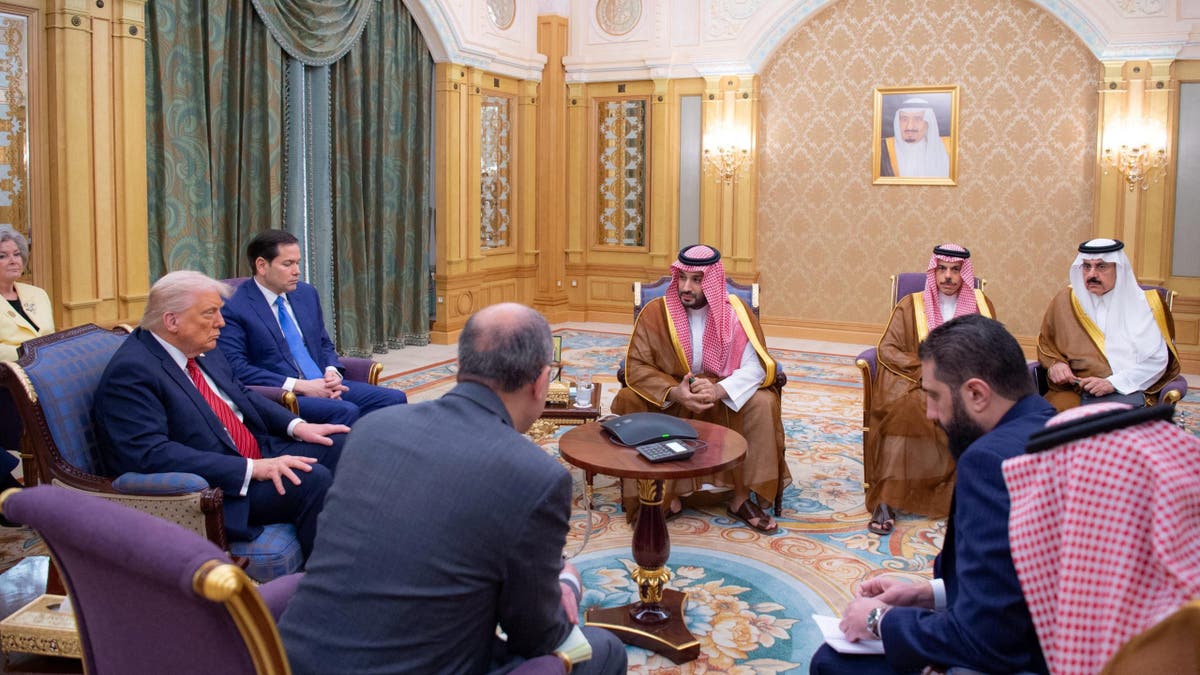
Syrian President Ahmed al-Sharaa meets with President Donald Trump and Saudi Crown Prince Mohammed Bin Salman and other officials in Riyadh, Saudi Arabia, in this handout released on May 14, 2025. (Saudi Press Agency/Handout via REUTERS)
Tehran is betting that the region’s rival powers — Turkey, Israel, the U.S. and the Gulf — will overplay their hands, allowing Iran to reenter through proxies, sectarian militias, or diplomatic manipulation.
The United States: Pulled back in
Though President Trump recently said Syria’s internal affairs are “not our war,” his administration’s tone has shifted. Secretary of State Marco Rubio called for de-escalation, and regional partners are urging a clearer U.S. role.
CLICK HERE TO GET THE FOX NEWS APP
“Real success will come from creating contingencies,” Taleblu said. “What are the costs if Syria collapses? What if Turkey overreaches, or Israel overextends? What if Iran comes back? The states that prepare for these questions.”
[title_words_as_hashtags




